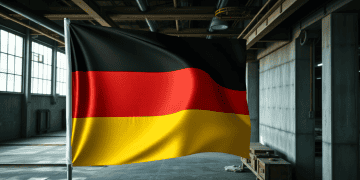Germany’s automotive sector, long regarded as a cornerstone of the country’s economy, is facing significant challenges as shifting market dynamics, economic conditions, and global competition reshape the industry. Volkswagen, Mercedes-Benz, and BMW—often referred to as Germany’s “Big Three” automakers—are experiencing declining production, increased operational costs, and shifting consumer demand, raising concerns about the industry’s future.
Declining Production and Economic Impact
Automobile manufacturing is a key contributor to Germany’s economy, accounting for approximately one-fifth of the country’s manufacturing output and around 6% of GDP when factoring in supply chain operations. However, production levels have declined in recent years. According to the International Organisation of Motor Vehicle Manufacturers, the number of cars produced in Germany dropped from 5.65 million in 2017 to 4.1 million in 2023. Volkswagen’s Wolfsburg factory, for example, has been operating well below its capacity, producing 490,000 cars in 2023, compared to its potential of 870,000.
These shifts come at a time when Germany is preparing for federal elections, with economic concerns playing a central role in public discourse. The automotive industry, which employs approximately 780,000 people directly and supports millions of other jobs, remains a focal point in discussions about economic recovery.
Shifts in Consumer Demand and Market Challenges
A notable factor contributing to the industry’s difficulties is the transition to electric vehicles (EVs). German automakers have invested significantly in EV development, driven by regulatory measures aimed at reducing carbon emissions. However, the expected growth in demand for EVs has not materialized at the anticipated pace. In late 2023, the German government’s sudden removal of subsidies for EV buyers contributed to a 27% drop in sales, further straining the sector.
In addition, German automakers are facing heightened competition from foreign manufacturers, particularly those based in China. While Germany’s automotive sector has historically benefited from strong sales in China, recent data indicates a decline. Volkswagen’s sales in China fell by 9.5% in 2023, while Mercedes-Benz and BMW saw declines of 7% and 13.4%, respectively. The rise of Chinese domestic automakers, particularly in the EV market, has also contributed to a reduction in market share for German brands.
Rising Costs and Global Trade Concerns
High labor and energy costs have also posed challenges for German automakers. In 2023, the average hourly labor cost in the German automotive industry was approximately €62, compared to €29 in Spain and €20 in Portugal. Following the energy crisis triggered by Russia’s invasion of Ukraine, industrial energy prices in Germany have remained significantly higher than those in other major manufacturing nations, such as the United States and China.
Concerns about international trade policies have further complicated the landscape. The European Union has introduced tariffs on Chinese-made EVs, citing competitive imbalances caused by government subsidies. However, German automakers have expressed concerns about potential retaliatory measures from China, which could impact their exports. Additionally, the possibility of increased tariffs on EU-made cars under a new U.S. administration has added to the uncertainty surrounding global trade.
Industry Response and Future Outlook
In response to these challenges, automakers have announced cost-cutting measures. Volkswagen, which employs 45% of its global workforce in Germany, has introduced plans to reduce costs and streamline operations. The company initially considered closing several factories, though this idea was later abandoned following negotiations with labor unions. Instead, Volkswagen aims to cut over 35,000 jobs by the end of the decade through voluntary measures.
Other automakers, including Mercedes-Benz and Ford, have also implemented restructuring initiatives to address rising costs and declining profitability.
Industry analysts suggest that the future competitiveness of Germany’s auto sector will depend on increased investment in innovation, infrastructure, and sustainable energy solutions. Experts have highlighted the need for continued support from policymakers to facilitate the transition to new technologies while maintaining job security and economic stability.
As Germany’s automakers navigate these economic and technological shifts, the decisions made in the coming years will play a crucial role in shaping the industry’s long-term trajectory and its contribution to the country’s economic landscape.
Get the best supply chain report news insights on The Supply Chain Report. Visit ADAMftd.com for free international trade tools.
#GermanyAutoIndustry #EconomicShifts #SupplyChainDisruptions #AutomotiveChallenges #ManufacturingTrends #TradePolicy #EVTransition















